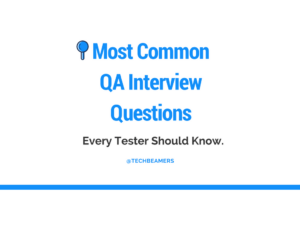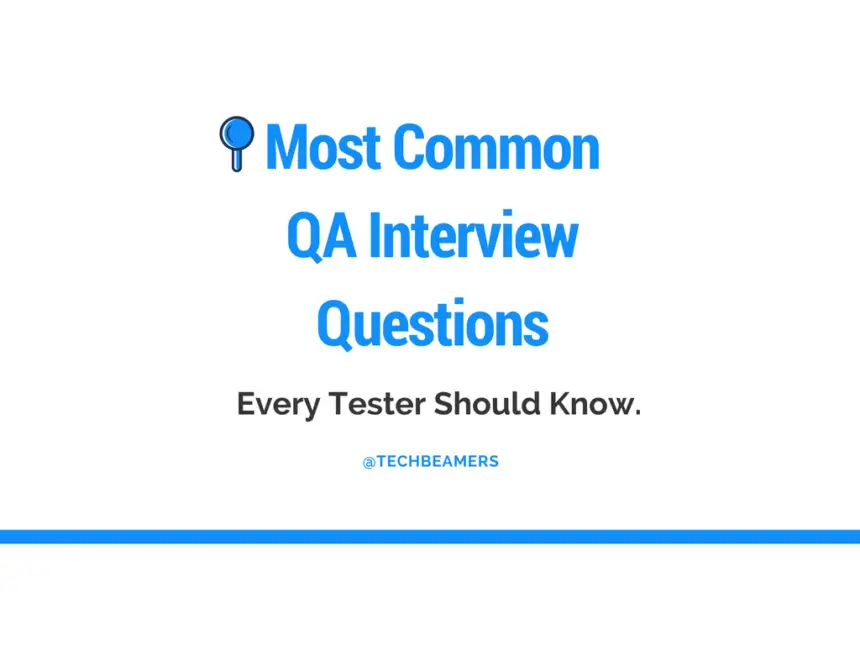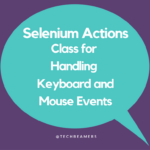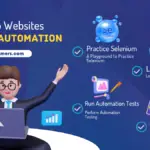This post is for QA engineers who have two or more years of experience and looking for a job change. To help them in their endeavor, we’ve added the most common QA interview questions and answers in this article.
We picked some of these common QA interview questions from a recent conversation that happened between a QA manager and Kiran. Kiran is working as a Software test engineer with one of the top IT companies in the NCR.
Also, she is an avid reader of this blog and shares her experience with us quite often. And we thought to bring her interview story to this post. If you read these most common QA interview questions to the end, then you’ll surely benefit and feel confident in your interviews.
Apart from these common QA interview questions, you might like to check out the below post that hosts the top twenty technical questions/answers for the Test engineers.
Now, it’s time to dig down and see how Kiran has replied to the most common QA interview questions.
Most Common QA Interview Questions & Answers.

Q-1: Please share something about yourself.
Ans: Hi, I’m Kiran. I have been working as a Software test engineer for the last two years and eight months.
I’ve started my career as a manual test engineer. However I have a bit of programming background, so soon I moved into the role of an automation tester.
I ran into many types of manual testing, some of which were.
- Acceptance Testing,
- Usability Testing,
- Functional Testing,
- Black Box Testing,
- Regression Testing,
- Compatibility Testing,
- Integration Testing,
- System Testing.
Note: Please add anything specific you did in your job profile.
As a part of the testing process, I was primarily responsible for the following tasks.
- Create test cases as per the client’s requirements,
- Executing test cases,
- Tracking and reporting defects.
Also, I used to update the requirements traceability matrix.
About some mixed stuff.
Taking about the other stuff, I’ve knowledge of databases like MYSQL/Oracle and programming languages like C/C++/Java.
In the area of automation, I’ve been using Selenium Webdriver 2.0 with Java for the last year. For learning, I’ve even used Python 3.0 with Selenium.
So, I can confidently say that I’m skilled in both manual and automation testing.
Next, it’s a common practice in my team that all of us update their status in daily standups. And share weekly reports with our manager.
I don’t limit myself only to opening a defect, instead, discuss it with the Dev team. And help them reproduce the issue to get a quick fix.
For bug tracking, we are currently using JIRA. But I’ve used Bugzilla as well in the past.
Q-2: Tell us something about your project.
Ans: You can split this question in the following manner and then think to answer.
- What is the theme of your Project?
- Why is it important for the organization?
- Why would somebody use it?
- What are the issues you came across during the project life cycle?
- How did you contribute towards the Project?
- What are your learnings from this Project?
Q-3: Share about your organization’s testing process.
Ans: We are a product company and follow the Agile testing process.
The top management shares the plan for the year and product managers conceive the set of features in line with the theme. They cook up stories and forward them to architects for research & estimation.
Finally, they prepare the product backlog and pass it on to the line managers/scrum masters for release planning.
Consequently, backlog grooming and sprint planning take place. For sprints, we create an acceptance test plan and write test cases.
During the sprint, we’ve to automate all the test cases and integrate them with the CI tool. We use Jenkins for continuous integration.
Every story has to cross the acceptance testing barrier. If it passes the acceptance criteria, then only we can mark it as closed. Else, it moves to the next sprint.
Also, all the acceptance cases from each sprint become part of a unified regression test suite. Both the acceptance and the regression suite have their jobs in the CI tool, so they get executed for every nightly build on a regular basis.
As I’ve already stated we use JIRA for creating defects. All defects must have a close status by the end of each sprint. Once all the sprints are over, then we deploy the release build in a pre-production environment. Integration/System testing takes place. Finally, a successful build gets delivered for customer evaluation.
Q-4: What is the reason for you to change?
Ans: I’m a career-oriented professional who believes in growing. I believe in continuous learning and updating myself. So, if some organization provides a rich learning environment, then I may intend to join.
Also, I’ve spent almost three years with my current company. And the product is already in the maintenance phase, so there isn’t much new to learn.
Next, I would like to learn about performance testing and tools like JMeter and Load Runner. This experience will provide the desired push to my career.
Q-5: Where do you want to see yourself after five years down the line?
Ans: I’m an organized professional who plans for the future. But my preference is to finish the current goals.
And at present, I’m preparing for a job change. So I’m studying whatever can help me to achieve this shift.
Also, I’ll try for ISTQB Certification this year. If I get this certificate, it will surely extend my chances.
In the short term, I see myself leading a team of engineers. And after five years, you can expect me in the role of a QA manager.
Q-6: Why should we recruit you?
Ans: I bring the best skill set in both manual testing and automation. So these skills would let me add value to the testing processes of your organization.
I also have hands-on knowledge of several testing tools like Selenium, REST API, Appium, and QC which I can use to train other team members.
My positive attitude and determination towards work and assignments would set me apart from other candidates. Furthermore, I like to work within the team and gel quickly with other members.
Consequently, I’m a fast learner and can bring immediate productivity to work.
Q-7: What did you achieve so far in life?
Ans: I was promoted as a Software Engineer last year, so that is my greatest achievement so far.
Also, I have got a good reputation among team members and gained the trust of my seniors and managers. They have nominated me for the best employee of the team award in the last quarter.
I even maintain a work-life balance and spend a good time with my family. They also support me in fulfilling my duties.
I won a trainer-on-duty award upon successfully teaching a group of members from a different group.
Q-8: What makes you hold up and what brings you down?
Ans: I’m sure that you want me to tell you about my strengths and weak points.
Strengths-
- My technical skills are the greatest source of my strength.
- I never quit out of a problem until I get to a solution.
- Sharing knowledge is something I like to do all the time. So I teach friends whenever I get time off.
- I’m a self-learner and have learned many testing tools on my own.
- I am also a dedicated professional and try to put in 100% effort while at work.
Weaknesses-
- Being a tester, I ask a lot of questions that sometimes cause to irritate others. So I first try to prioritize and then ask only the top-priority questions.
- I remain curious to know things to the depth which at times turns into delays. Here, I need to be cautious if it’s impacting the schedule.
- I’m a straightforward person and convey feedback on the face which can offend people sometimes.
Also, please go through the below interview questions, they might also be useful for you.
- Software Testing Interview Questions and Answers – Part1
- 20 Interview Questions for Manual Testers – Part2
Quick Wrap-up of Most Common QA Interview Questions/Answers.
We always try to pick a topic that can help in your job. Also, we wish to teach you skills that matter the most in your work. That’s why we came up with this blog post on the eight most common QA interview questions/answers.
It would be nice if you let us know your feedback on this post.
Also, you can request us to write on a topic of your choice. We’ll add it to our writing roadmap.
If you liked the post, then please don’t leave without sharing it with friends and on social media.
Keep Learning,
TechBeamers.









